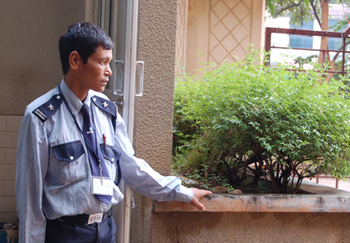
There are dozens of private security companies in Bangalore, and those who run them do thriving business. They hire men like me, paying us a pittance, and we are sent to guard the houses of the rich and to stave off robbers, for which they charge their clients huge amounts.
For some months now I’ve been working as a guard in a block of apartments in one of the most ‘posh’ parts of Bangalore. Those who live in these apartments are all very rich people. Some of them have three cars, and everyone has more than two servants. They all speak English—I don’t know the language but I can recognize it when they speak —and by the way the dress and talk you’d think they were all English people, not Indians.
My work as a security guard is boring, and it’s also full of tension. I have twelve-hour duty every day, and sometimes this is at night, when I have to stay awake all through. Each time a car enters through the gates I have to jump to my feet and salute. If I don’t, I’ll be accused of not showing respect to its occupants—rich people, of course—and then I might lose my job. I have to take regular rounds of the apartments to make sure that no robbers are about. Besides that, I have to see that the cars are parked in their places, run after the electrician to see that he does his work, see that the kids of the rich folks who live in the apartments don’t run out of the building premises, and even do errands for the apartment residents.
Working twelve hours non-stop every day at my age is tiring. It’s especially demanding when I have night duty, because then although I feel so sleepy I can’t put up my legs for even five minutes. Supervisors from our company come on surprise checks every once in a while, and if they find I’m napping I’m sure to lose my job—they can easily do without me because it’s easy for them to get someone to take my place.
We have no facility for making even a cup of tea, and that’s something I really long for especially during night duty. Once, another guard suggested that we pool in some money and buy an electric kettle so that we could make tea, but when the members of the residents’ welfare committee, who are all very rich people, heard of it they scolded us saying, ‘That’ll consume so much electricity! Are your fathers going to pay it or what?’ And so, we called off our plan.
I’m just a simple guard, and although my work doesn’t require much skill, for the rich people I work for I play an indispensible role. But they don’t respect me at all for it just because I am a poor man. Imagine if no one agreed to work as guards for them how easy it would be for robbers to loot their homes! Their wealth is dearer to them than their lives and we are here to protect it, but yet they treat us like non-beings.
I’m a fifty year old man, and in Nepal men of our age are treated with love and respect by everyone. But not so here. I’m just a faceless nobody for the rich apartment folks. Not one of them even knows, or has cared to ask, my name. If they want to call me they shout out, ‘Security! Security!’, as if that is what my parents named me. From how they address me you know that they only look at me as the role that I peform for them and not as a human being with an identity of my own.
Not one of them, not even their young children, looks at me when she or he passes me by. I have to stand up and salute them when they walk past, but do you think they even bother to acknowledge my existence with just a nod or a look in the eye, leave alone answering my greeting or smiling? On the contrary, it is often that I have to face a torrent of abuse from some of them for no fault of my own.
There’s an exception to this, I have to say, and she’s a frail-looking, middle-aged woman who comes sometimes to meet one of the apartment residents, a friend of hers. She’s clearly not rich because she always comes in an auto-rickshaw, wears faded clothes and carries a plastic packet instead of a leather hand-bag. I don’t know her name, nor does she know mine, but whenever she comes she gives me a wonderful smile and greets me with a wave of her hand.
You won’t imagine how happy I feel when I see that woman! With those simple gestures of hers she acknowledges that I exist, that I, too, am a human being, like everyone else, even though I am a poor Nepali security guard.
(As told to Yoginder Sikand)






Comments
Add new comment